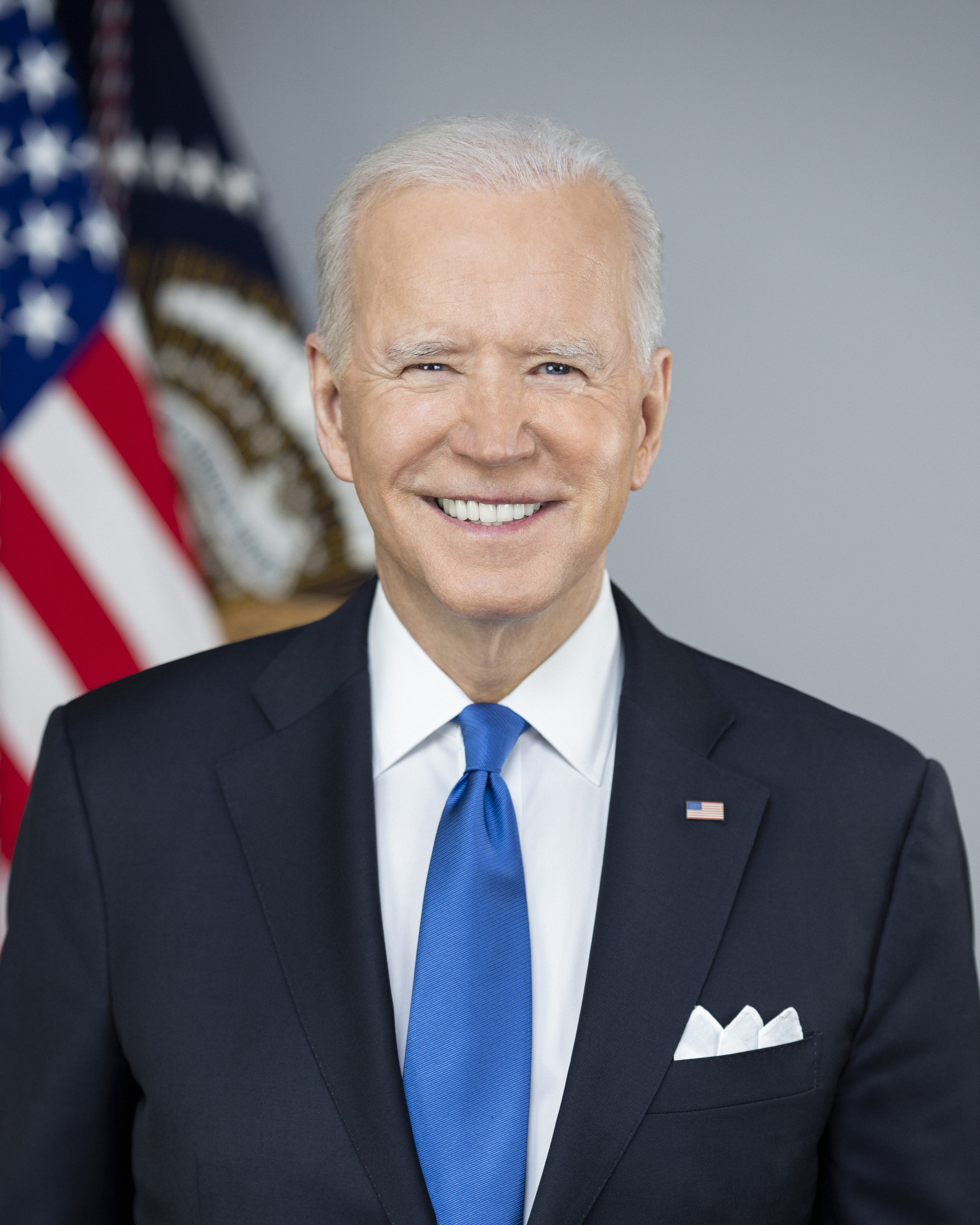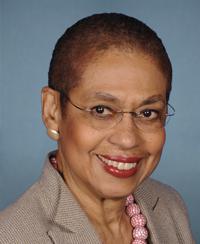Washington D.C.
District of Colombia (D.C.)
The District of Colombia has a non-voting delegate that they send to the House of Representatives. This delegate can serve on committees, introduce legislation, and participate in debate but cannot vote on the House floor.
Washington, D.C. does not have representation in the Senate.
Current President of the United States of America
Full Name: Joseph Robinette Biden Jr.
Date of Birth: November 20, 1942
Birthplace: Scranton, Pennsylvania, U.S.
Early Life and Education: Joe Biden was born in Scranton, Pennsylvania, and raised in a working-class family. He attended Archmere Academy in Claymont, Delaware, where he was a standout student and football player. Biden earned a Bachelor of Arts degree in History and Political Science from the University of Delaware in 1965. He then attended Syracuse University College of Law, graduating with a Juris Doctor in 1968.
Personal Life: Joe Biden is married to Jill Biden, an educator, and they have a blended family with four children. Their personal life has been marked by both tragedy and resilience; Biden’s first wife and daughter died in a car accident in 1972, and his son Beau Biden passed away from brain cancer in 2015.
Early Career: After completing his law degree, Biden moved back to Delaware and began practicing law. He also became involved in local politics, serving on the New Castle County Council from 1970 to 1972. Biden’s early legal and political career focused on civil rights and social justice issues, reflecting his commitment to public service.
Joe Biden (D)

Term Start: January 20, 2021
Political Career:
- New Castle County Council: Elected in 1970, Biden served on the New Castle County Council in Delaware from 1970 to 1972.
- U.S. Senate: Elected in 1972, Biden served as a U.S. Senator from Delaware from January 3, 1973, to January 15, 2009. He was one of the youngest individuals ever elected to the Senate at the age of 29. During his tenure, Biden focused on foreign relations, criminal justice, and drug policy, serving as Chairman of the Senate Foreign Relations Committee and the Senate Judiciary Committee.
- Vice President of the United States: Elected in 2008, Biden served as the 47th Vice President under President Barack Obama from January 20, 2009, to January 20, 2017. As Vice President, Biden played a key role in legislative negotiations and policy initiatives, particularly in areas related to foreign policy, healthcare, and economic recovery.
- President of the United States: In 2020, Biden ran for president as the Democratic nominee, selecting Kamala Harris as his running mate. He won the election against incumbent President Donald Trump and took office as the 46th President of the United States on January 20, 2021. Biden’s campaign focused on issues such as the COVID-19 pandemic, economic recovery, healthcare, and racial justice.
Presidency: As president, Biden has focused on addressing the COVID-19 pandemic, promoting economic recovery, expanding healthcare access, and addressing climate change. His administration has worked on implementing a comprehensive vaccination campaign, passing the American Rescue Plan to provide economic relief, and proposing infrastructure investments through the Build Back Better plan. Biden has also emphasized the importance of restoring alliances and reasserting U.S. leadership on the global stage.
Legislative Focuses:
Economic Measures
- American Rescue Plan: Signed early in his presidency, this plan aimed to address the economic impact of the COVID-19 pandemic by providing financial aid to individuals, businesses, and local governments, and funding the national vaccination campaign.
- Bipartisan Infrastructure Law: This landmark legislation focused on rebuilding roads, bridges, and public transit, expanding broadband access, and addressing environmental cleanup efforts.
- CHIPS and Science Act: Aimed at boosting domestic semiconductor manufacturing, this act has led to significant investments in American manufacturing and created numerous jobs.
- Inflation Reduction Act: This comprehensive act focuses on reducing healthcare costs, particularly prescription drugs, and investing in clean energy to combat climate change.
Health and Social Policies
- Affordable Care Act (ACA) Enhancements: Efforts have been made to protect and expand the ACA, resulting in lower health insurance costs for many Americans.
- PACT Act: Expanded healthcare benefits for veterans exposed to toxic substances.
- Marriage Equality: Enacted the Respect for Marriage Act, ensuring federal protection for same-sex and interracial marriages.
Climate and Environmental Actions
- Rejoining the Paris Climate Accord: On his first day in office, Biden recommitted the U.S. to the international agreement aimed at combating climate change.
- Historic Climate Investments: The Inflation Reduction Act includes substantial funding for clean energy initiatives.
Judicial and Criminal Justice Reforms
- Supreme Court Appointments: Appointed Justice Ketanji Brown Jackson, the first Black woman and public defender to serve on the Supreme Court.
- Criminal Justice Reform: Issued executive orders to promote police accountability, ban chokeholds, and restrict no-knock entries.
International Relations and Defense
- Support for Ukraine: Provided significant support to Ukraine following Russia’s invasion, rallying international allies to defend democracy.
- Defense Initiatives: Focused on cybersecurity and modernizing the military to address contemporary threats.
Additional Notable Actions
- Student Debt Relief: Approved substantial student loan debt cancellation and increased Pell Grants.
- Gun Control: Passed the Bipartisan Safer Communities Act, the most significant gun control legislation in decades.
President Biden is known for his extensive experience in public service, focusing on healthcare, economic recovery, climate action, and social justice. His background in law, long tenure in the U.S. Senate, and eight years as Vice President shape his legislative and executive priorities.
Links to follow Joe Biden
House Representative:
Eleanor Norton (D)

Term Start:
Full Name: Eleanor Holmes Norton
Date of Birth: June 13, 1937
Birthplace: Washington, D.C., U.S.
Early Life and Education: Eleanor Holmes Norton was born and raised in Washington, D.C. She attended Dunbar High School, a prestigious African American high school in the nation’s capital. Norton went on to earn her Bachelor of Arts degree from Antioch College in 1960. She then attended Yale University, where she received a Master of Arts in American Studies in 1963 and a Juris Doctor from Yale Law School in 1964.
Personal Life: Eleanor Holmes Norton is married to Edward Norton, and they have two children. Known for her tireless advocacy for civil rights and her dedication to the residents of Washington, D.C., Norton continues to work towards policies that promote justice, equality, and opportunity for all.
Early Career: After completing her education, Norton began her career in law and civil rights. She served as an assistant legal director at the American Civil Liberties Union (ACLU), where she was involved in significant civil rights cases. Norton became well-known for her advocacy for women’s rights and racial equality. She also served as a law clerk for Federal District Court Judge A. Leon Higginbotham Jr.
Political Career:
- U.S. House of Representatives: Elected in 1990, Norton has served as the Delegate to the United States House of Representatives from the District of Columbia since January 3, 1991. As a non-voting delegate, she represents the interests of the residents of Washington, D.C., in Congress.
Committees:
- Committee on Oversight and Accountability
- Committee of Transportation and Infrastructure
Legislative Achievements:
- D.C. Statehood: Norton is a leading advocate for D.C. statehood. She has introduced and supported legislation aimed at granting the District of Columbia full representation in Congress and statehood status.
- Civil Rights: Throughout her career, Norton has been a strong advocate for civil rights and social justice. She has worked on legislation to combat discrimination, protect voting rights, and promote equality.
- Economic Development: Norton has focused on economic development and job creation in the District of Columbia. She has supported measures to stimulate investment, improve infrastructure, and enhance public services in D.C.
- Education: Norton advocates for improving education at all levels. She supports increased funding for public schools, higher teacher salaries, and measures to make higher education more affordable and accessible.
- Transportation: As a member of the House Committee on Transportation and Infrastructure, Norton has worked on legislation to improve transportation systems, enhance public transit, and ensure the safety and efficiency of the nation’s infrastructure.
Congresswoman Norton is known for her dedication to D.C. statehood, civil rights, economic development, education, and transportation. Her background in law and public service, along with her extensive experience in the U.S. House of Representatives, shape her legislative priorities. She continues to advocate for policies that benefit the residents of the District of Columbia and promote social justice.
